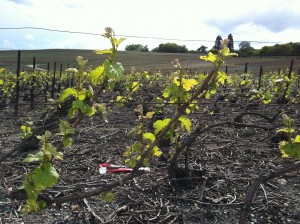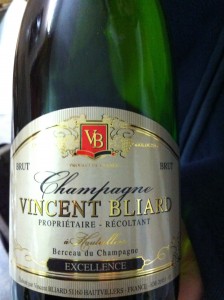I love to walk, every day twice a day, my dog Betty and I enjoy our vineyard landscapes, some wildlife and fresh air – well at least till last week when spraying season started… Last Thursday, during a great walk in and among the vines I noticed Betty was really struggling, sneezing and panting heavily. I just assumed it was because of the heat and decided to cut the walk a little shorter. When we got home she did not want to drink, but instead she collapsed on the floor and stayed there for quite a while before she brought up some of her breakfast. In the mean time I felt as if someone had punched all the air out of my lungs, my head was exploding, I was very thirsty and as soon as I drank any water I was overcome with nausea and crashed. The rest of the evening was spent by both of us in great uncomfort…:-( What in fact had happened was we had been passing through some vineyards which were being sprayed and inhaled some of the toxic pesticides. As an asthmatic I know I am more sensitive – I had the same problem in New Zealand a few years ago – but I was amazed it had affected Betty as well. Since then I have been really careful where I walk but as the spray residue is still in the air I have had headaches and had to take ventolin every time after I have been out. I have also noticed that there is a lot less wildlife around. Once we are in the vineyards we see hardly any birds nor rabbits or insects any more… I guess they have either died or left to other places because of the sprays.
This experience reminded me of the chat I had with the Bliards when I visited them last month. Vincent Bliard is the only certified organic grower in Hautviller. His father Jean started to farm organically about 40 years ago because his wife was having averse reactions to the sprays. Working the soil and working with natural components instead of chemicals became their way of life and many a person thought they were totally crazy and that they would not last…When the certification came in about 20 years ago they signed up for it and ever since the Bliard have been advocates of the organic farming movement in Champagne. Up till a few years ago they were one of less than 20 certified producers, but are really happy that the movement is finally getting a little more traction today. The Bliards spend most of their time working their vineyard – they believe that a lot of attention is needed to give the soil and vines what they need rather than what we think they may need. They produce about 15,000 bottles of Champagne per year and sell the grapes of the border rows to the Negotiants. Those grapes often have residual spray from the neighbouring plots so they cannot be used for the organic wine production.Franck Pascal, an excellent biodynamic producer a little further down the Vallee de la Marne, is a little less lenient about residual spray from his neighbours. We briefly spoke about the spray contamination issue at the Terres et Vins de Champagne tasting last month and he told me that he had written to his neighbours asking them to not spray or use chemicals in the 3 rows closest to his 3.5 HA vineyard. He explained in the letter that if they would continue with the sprays he would loose significant amounts of his crop and with that significant potential income. To make up for the latter he would ask them to pay the difference as their sprays were the reasons for this loss. I am really looking forward to hear more about this when I visit him early June!
In summery I do believe that at least sustainable farming will be our only gateway to the future – we have to look after the land and our environment and need to protect it in order to preserve it for future generations. Sustainable farming is already widely applied in New Zealand, South Africa and large parts of France and Italy and I believe more regions will follow suit. I even believe a marginal wine growing region such as Champagne will eventually follow suit and reduce the chemical treatments and replace them by more “natural” ones. It will not happen overnight but the younger generation winemakers seems to be a lot more aware of the environment and are starting to work towards it. Some of the proof toward this last statement can be seen in the organic farming guide/course thought at the prestigious viticulture institute of Avize now, and the helicopter and plane sprays ban as from next year.
To finish I would like to point out that some Champagne houses such as Duval-Leroy or Canard Duchene are are also making and marketing an organic Champagne. And I believe more will follow suit providing they will be able to purchase enough organic grapes. And I think this again will be a stimulator for more grape growers to change their farming methods and convert to organic farming :-)


